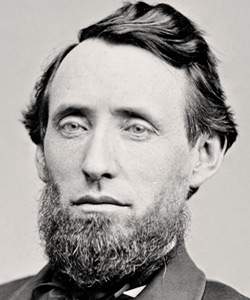Shelby Moore Cullom (American National Biography)
Scholarship
As was the case with many late nineteenth-century public figures, the Civil War became the moral reference point for Cullom's political career. Unlike most others, he spent the war years as a Republican politician, not a soldier. Initially wary of the radical image of the new party, Cullom supported Millard Fillmore in 1856 and was elected to the state legislature on a combined Fillmore-Free Soil ticket. Then in 1858, he took the biggest (and perhaps the only) gamble of his career by hitching his fortunes to Lincoln and the Republicans. Cullom returned to the Illinois General Assembly in 1861 and served as Speaker of the lower house. He moved on to the U.S. House of Representatives in early 1865 and remained in office until 1871. Cullom returned to the Illinois General Assembly from 1873 to 1875, again holding the post of speaker from 1873 to 1874. Two terms as governor of Illinois followed between 1877 and 1883. Finally, in 1883 Cullom began the first of five consecutive terms in the U.S. Senate lasting until 1913. Throughout his tenure he clung to the image of Lincoln and the dictates of the Republican party. At the outset of his national political career, Cullom was a member of Lincoln's funeral party. During the intervening half-century, Cullom waved the bloody shirt, memorialized the "boys in blue," and became so closely linked with the GOP in Illinois that he developed into a visible symbol of the party's heroic past, "the man who looked like Lincoln."
Thomas R. Pegram, "Cullom, Shelby Moore," American National Biography Online, February 2000, http://www.anb.org/articles/05/05-00167.html.
Shelby Moore Cullom (Congressional Biographical Directory)
Reference
CULLOM, Shelby Moore, (nephew of Alvan Cullom and William Cullom), a Representative and a Senator from Illinois; born in Wayne County, Ky., November 22, 1829; moved with his father to Tazewell County, Ill., in 1830; received an academic and university training; moved to Springfield, Ill., in 1853; studied law; admitted to the bar in 1855 and commenced practice in Springfield; elected city attorney in 1855; member, State house of representatives 1856, 1860-1861, and served as speaker of the house during the second year; elected as a Republican to the Thirty-ninth, Fortieth, and Forty-first Congresses (March 4, 1865-March 3, 1871); chairman, Committee on Territories (Forty-first Congress); member, State house of representatives 1873-1874, and served as speaker in 1873; Governor of Illinois 1877-1883, when he resigned; elected as a Republican to the United States Senate in 1882; reelected in 1888, 1894, 1900, and 1906 and served from March 4, 1883, to March 3, 1913; chairman, Committee on Expenditures of Public Money (1885-87), Committee on Interstate Commerce (1887-93; 1895-1901; 1909-11), Committee on Foreign Relations (1901-11), Republican Conference Chairman (1911-13); Regent of the Smithsonian Institution 1885-1913; chairman and resident commissioner of the Lincoln Memorial Commission in 1913 and 1914; member of the commission appointed to prepare a system of laws for the Hawaiian Islands; died in Washington, D.C., January 28, 1914; interment in Oak Ridge Cemetery, Springfield, Ill.
"Cullom, Shelby More," Biographical Directory of the United States Congress, 1774 to Present, http://bioguide.congress.gov/scripts/biodisplay.pl?index=C000973.









